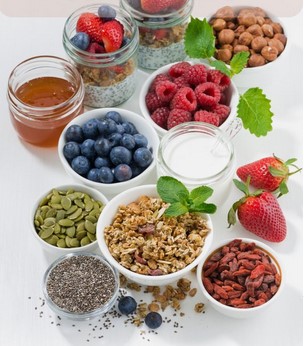Introduction:
In a world inundated with processed and convenience foods, the concept of “supercharging” our health with whole foods and balanced nutrition has never been more relevant. Whole foods are unprocessed or minimally processed foods that retain their natural nutrients, fiber, and phytochemicals, offering unparalleled health benefits compared to their processed counterparts. In this article, we’ll explore the transformative power of whole foods and balanced nutrition and how they can supercharge your health for optimal well-being.
- The Essence of Whole Foods:
Whole foods encompass a wide variety of nutrient-dense options, including fruits, vegetables, whole grains, lean proteins, nuts, seeds, and legumes. Unlike processed foods, which are often stripped of their natural nutrients and loaded with added sugars, unhealthy fats, and preservatives, whole foods provide essential vitamins, minerals, antioxidants, and fiber in their purest form. By incorporating a diverse array of whole foods into your diet, you can nourish your body with the building blocks it needs to thrive. - The Power of Balanced Nutrition:
Balanced nutrition involves consuming a variety of foods from all the major food groups in appropriate proportions to meet your body’s nutritional needs. A balanced diet typically includes:
- Fruits and vegetables: Rich in vitamins, minerals, antioxidants, and fiber, fruits and vegetables form the foundation of a healthy diet and support overall health and vitality.
- Whole grains: Whole grains such as brown rice, quinoa, oats, and whole wheat provide complex carbohydrates, fiber, and essential nutrients for sustained energy and digestive health.
- Lean proteins: Protein-rich foods such as lean meats, poultry, fish, tofu, beans, and legumes are important for muscle growth, repair, and maintenance.
- Healthy fats: Sources of healthy fats include avocados, nuts, seeds, and olive oil, which provide essential fatty acids and support heart health and brain function.
- Dairy or dairy alternatives: Calcium-rich foods such as milk, yogurt, and cheese or fortified plant-based alternatives contribute to bone health and overall nutrition.

- Benefits of Whole Foods and Balanced Nutrition:
Embracing whole foods and balanced nutrition offers a multitude of health benefits, including:
- Improved overall health and well-being: Whole foods provide the essential nutrients your body needs to function optimally, supporting every aspect of your health, from immunity and digestion to energy metabolism and cognitive function.
- Weight management and satiety: Whole foods are typically lower in calories and higher in fiber, protein, and water content than processed foods, promoting feelings of fullness and satisfaction while supporting sustainable weight management.
- Reduced risk of chronic diseases: A diet rich in whole foods and balanced nutrition has been linked to a reduced risk of chronic diseases such as heart disease, diabetes, cancer, and obesity, thanks to their abundance of protective nutrients and phytochemicals.
- Enhanced athletic performance: Whole foods provide the nutrients necessary for muscle growth, repair, and recovery, making them essential for athletes and active individuals seeking to optimize performance and endurance.
- Practical Tips for Incorporating Whole Foods:
Incorporating more whole foods into your diet is easier than you might think. Here are some practical tips to help you get started:
- Fill half your plate with fruits and vegetables at each meal to maximize nutrient intake and promote satiety.
- Choose whole grains such as brown rice, quinoa, oats, and whole wheat pasta over refined grains for added fiber and nutrients.
- Opt for lean proteins such as poultry, fish, tofu, beans, and legumes to support muscle growth and repair.
- Include healthy fats from sources such as avocados, nuts, seeds, and olive oil in your meals to enhance flavor and satisfaction.
- Minimize consumption of processed and packaged foods high in added sugars, unhealthy fats, and preservatives, and instead focus on whole, minimally processed options.
Conclusion:
Whole foods and balanced nutrition are powerful allies in the quest for optimal health and well-being. By embracing the abundance of nutrient-rich options available in nature and prioritizing balanced meals that nourish your body from the inside out, you can supercharge your health and unlock your full potential for vitality and longevity. Whether you’re seeking to improve your overall health, manage your weight, or enhance athletic performance, whole foods and balanced nutrition provide the essential building blocks for a healthier, happier you. So, fuel your body with the power of whole foods and embark on a journey towards a lifetime of vibrant health and wellness.
- How to Grow Garlic Successfully at Home in Containers
 How to Grow Garlic Successfully at Home in ContainersWhat You NeedGarlic Cloves: Organic cloves or seed garlicContainers: At least 6 inches deep with good drainagePotting Mix: Well-draining, rich in organic matterWatering … Read more
How to Grow Garlic Successfully at Home in ContainersWhat You NeedGarlic Cloves: Organic cloves or seed garlicContainers: At least 6 inches deep with good drainagePotting Mix: Well-draining, rich in organic matterWatering … Read more - Homemade Pizza Dough Recipe
 Homemade Pizza Dough RecipeIngredients:2 1/4 teaspoons (1 packet) active dry yeast1 teaspoon sugar1 cup warm water2 1/2 cups all-purpose flour2 tablespoons olive oil1 teaspoon saltDirections:In a small bowl, combine the active … Read more
Homemade Pizza Dough RecipeIngredients:2 1/4 teaspoons (1 packet) active dry yeast1 teaspoon sugar1 cup warm water2 1/2 cups all-purpose flour2 tablespoons olive oil1 teaspoon saltDirections:In a small bowl, combine the active … Read more